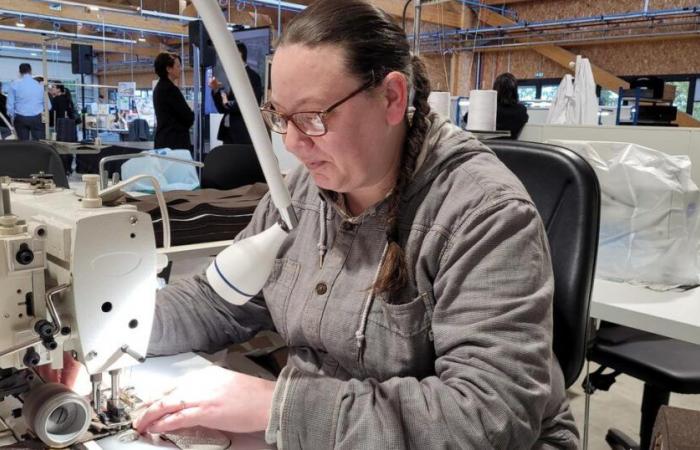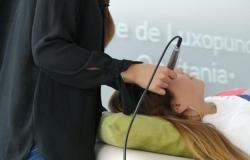REPORTAGE – Since 1965, it has welcomed people, most of whom have cognitive disabilities. On Thursday, an expanded and modernized factory was inaugurated in Cholet.
For several weeks, Cholet (Maine-et-Loire) has been in the headlines due to the announcement of the closure of its Michelin site. Meanwhile, two kilometers further on, the Amipi-Bernard Vendre Foundation can boast of a more joyful destiny. On Thursday, November 21, the inauguration of its new “learning and inclusive factory” was held, where 85 employees with cognitive disabilities work.
During this Industry Week and Duoday Day (valid/disabled pairs), prefect, regional president, mayor and even senator braved the weather conditions to attend. Unavailable, the Minister of Industry, Marc Ferracci, still wanted to send a video of support. Proof that this model focusing on the integration of disabled people and the maintenance of industrial activity in France is proving its worth. “Society is the big winner since the overall cost of labor is, in the end, four times more efficient than the overall cost of non-work on the condition that everyone plays the game”summarizes Jean-Marc Richard, president of the Foundation.
Six factories in the West
Today, the six factories located in the west of France (Cholet, Nantes, Angers, Blois, Le Mans and Tours) have 840 employees, including 700 operators who are autistic, schizophrenic, etc. or experiencing learning difficulties. It was in Cholet that it all began. In the 1960s, Maurice Vendre saw his 6-year-old son Bernard, with Down syndrome, being excluded from school. This pushed him to act and first create IMPs (medical-pedagogical institutes), then IMPro (medical-professional institutes) then leading to work workshops, based on learning. “It was my husband who had the idea and the feeling that there was the possibility of working on brain plasticity to repair faulty connections”proudly details co-founder Maryse Vendre.
If the requirement remains, the manufacturing of products does not happen without the development of the humans who design them. Thus, a learning pedagogy specific to the Foundation was developed, linked to mimetic psychology. “Work is therapy”summarizes Maryse Vendre. The employees, seemingly relaxed and focused when we meet them, are pulled upwards. Some have been there since the 1990s and have been able to learn several trades. Others stay there a short time and join a so-called traditional company. They are also encouraged to do so, if they wish. “Every year, there are around twenty insertions”indicates HR Director Sophie Labatut, for 50 to 100 recruitments per year at Amipi. Recruitment days are organized, during which future “Amipians” or “hero”as they are called, show what they can do. This helps supervisors entrust them with suitable tasks.
Requirement and performance
“Each goal is personalized. We must not set them up for failure.”explains director Éric Ferré of the new Cholet factory. Every hour, a bell rings and the employee records the quantities he has produced. A way to combine demands and performance. In March, the 67 people, now 85, and normally 140 by 2027, moved into a brand new hangar. This move does not only mean expansion: it goes hand in hand with a diversification of activities. A “significant turning point in the modernization of Amipi”summarizes the press release.
Until now, the factories were subcontractors specializing in automotive wiring, working with renowned clients such as Renault. Now, the time has come for diversification. Behind her sewing machine, Céline sets about making handles that will be used for shopping bags from a luxury brand. Textiles are one of the new activities at the Cholet site, with the assembly of small electronic devices and soldering (assembly operation which is obtained by melting a filler metal) of electronic cards. “The economic context (from a slowing automobile market, Editor’s note) fact that we have developed a diversification strategy”explains Quentin Lambert, deputy general director in charge of transformation. The Amipi Foundation also has an entity “advice and training” which aims to train managers within companies. Thus, Louis Vuitton and Sodebo have used it. More broadly, the support of their entrepreneurial clients is valuable.
“It is with them that we build the desirable society. Our common wish is to humanize capitalism, because obviously capital is needed to create businesses. Jean-Dominique Senard (the boss of Renault, Editor’s note)says: we must humanize the market economy by making it more responsible and above all, as far as we are concerned, more learning. supports President Jean-Marc Richard. “It’s difficult to unify a country, but if you make it learning, the gains are enormous”he insists, in front of an attentive audience. “It’s not every day that you open a factory. It’s a ray of sunshine to find yourself on this site”proclaims the mayor of Cholet, Gilles Bourdouleix, while the rain is in full swing. The councilor ends his speech by announcing that part of rue Trémentines, where the factory is located, will soon be renamed rue Maurice Vendre, in homage to the founder of Amipi.
LT / Le Figaro






